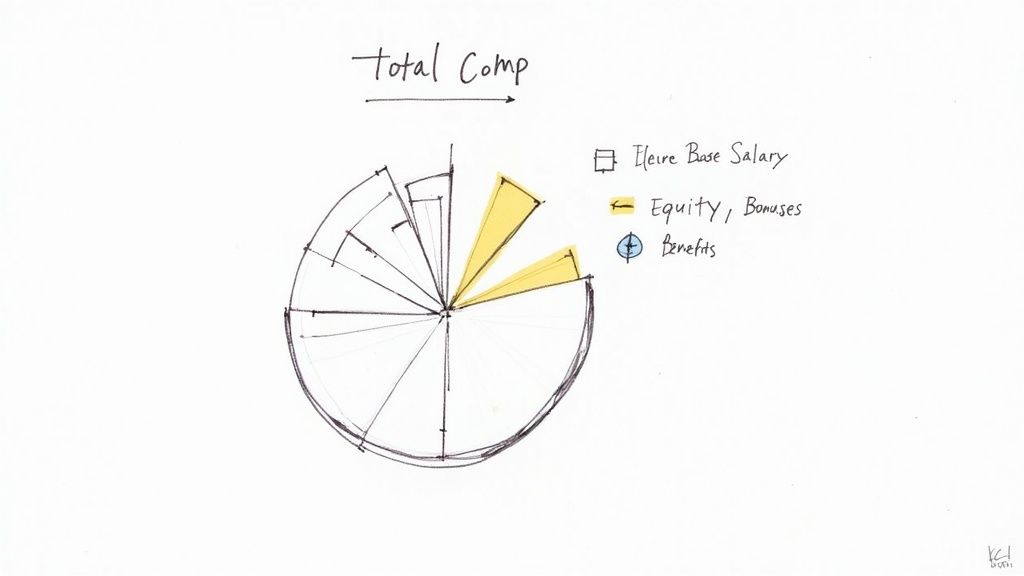If you’ve heard that the average remote software engineer salary is around $70,877 per year, you’ve only got a tiny piece of the puzzle. That number is just a starting point. Your actual paycheck can swing wildly depending on where you are, what you know, and how long you’ve been doing it. The top-tier engineers? They’re earning way, way more.
What Is a Typical Remote Software Engineer Salary

Trying to nail down a “typical” remote software engineer salary is like asking for the average price of a car. Are we talking about a used sedan or a brand-new luxury SUV? The global average gives us a ballpark figure, but it doesn’t really tell you what you should be earning. The real story is in the details.
Think of that $70,877 figure as the sticker price on a base model. The final number you drive off the lot with—or in this case, see on your offer letter—is all about the upgrades. Your specific “features,” like your programming languages, specializations, and years in the trenches, are what really determine your value in the market.
A Quick Look at Global Averages
Digging into the data from over 20,000 remote developers, it’s clear that while the global average hovers around that $70,877 mark, geography is a game-changer. For example, North America pulls that average way up, with developers there earning closer to $82,757 per year.
This brings us to one of the biggest truths in the remote job market: where the company is based (and sometimes where you live) still has a massive impact on your salary. A startup in San Francisco or a bank in New York simply has to offer higher salaries to compete for talent, and that often extends to their remote hires. We break this down even further in our guide to finding high-paying remote jobs.
Your geographic location, technical specialization, and level of experience are the big three. Master the interplay between these factors, and you’ll be in the driver’s seat of your earning potential.
To give you a clearer picture of just how much location matters, let’s look at some typical salary ranges across the globe.
A Snapshot of Remote Software Engineer Salaries by Region
This table provides a quick look at average annual salaries for remote software engineers in different parts of the world. It’s a great starting point for understanding how compensation can vary based on geography.
| Region | Average Annual Salary (USD) |
|---|---|
| North America | $110,000 - $165,000+ |
| Western Europe | $75,000 - $120,000 |
| Eastern Europe | $45,000 - $80,000 |
| Latin America | $40,000 - $75,000 |
| Asia | $35,000 - $70,000 |
The difference is stark, isn’t it? An engineer in North America could easily earn double what a peer in Asia makes for the exact same role. In the next sections, we’ll get into why these gaps exist and, more importantly, how you can position yourself to land offers at the top end of these ranges.
How Your Location Dictates Your Earning Potential

Here’s a classic remote work puzzle: why would two software engineers with identical skills, working for the same company, earn wildly different salaries? The answer, nine times out of ten, is geography. Even when your office is your laptop, your physical address remains one of the biggest levers on your remote software engineer salary.
It feels a bit backward, right? If the job is remote, why should your city even matter? It comes down to a strategy many companies—especially the big, globally distributed ones—have embraced: location-based pay. They adjust your compensation based on the cost of living and local market rates where you live.
Think of it as a currency conversion for your talent. A $120,000 salary can make you feel like a king in a city with a low cost of living, but it might just be scraping by in a major tech hub like San Francisco or New York. Companies use this model to keep things fair and competitive across their entire team, no matter which corner of the world they’re logging in from.
Understanding Location-Based Pay Models
So, what does this look like in practice? The most common method involves creating salary bands for different geographic “tiers.” A company might sort cities and regions into a few buckets, like high-cost, medium-cost, and low-cost areas.
For instance, a particular role might have a baseline salary of $150,000 for someone living in a top-tier city. But that same job could be adjusted down to $125,000 for an engineer in a medium-cost area, or maybe $100,000 in a low-cost region. The goal is to give every employee similar purchasing power relative to their local economy.
This approach lets companies offer competitive salaries that are actually sustainable as they hire people from all over the world. It avoids the awkward situation where one employee’s salary funds a life of luxury while another’s barely covers rent in a pricey city.
The GitLab Example: A Transparent Approach
One of the most famous champions of this model is GitLab. They’re known for their incredibly transparent compensation calculator, which publicly shows exactly how they figure out salaries. Their formula boils it down to a few key ingredients:
- Benchmark Salary: A base number for the role, pulled from market data.
- Location Factor: A multiplier based on the market cost in the employee’s specific city.
- Level Factor: An adjustment for seniority and experience.
- Compa Ratio: A modifier for individual performance and experience.
This level of openness is still pretty rare, but it gives us a fascinating peek behind the curtain of remote pay. It also drives home just how important it is to ask about a company’s compensation philosophy during the interview process. If you’re thinking about working across borders, our guide to international remote work can give you some extra pointers.
National vs. Global Pay Scales
Now, not every remote company docks pay based on your address. A different camp has emerged, one that offers a single pay scale for everyone—often pegged to a high-cost market like San Francisco—no matter where their employees call home. For engineers in lower-cost areas, this can be an absolute goldmine.
But be warned: these jobs are fiercely competitive. When a company dangles a single, top-tier salary, they attract the best of the best from every continent, making for a tough application process. To get a real sense of how your location stacks up, it’s worth checking out a global guide to salary equivalent by country. It can help you set realistic expectations, whether a company adjusts for location or pays everyone the same.
The Value of Your Specialization and Tech Stack

While your location might set a baseline for your salary, your specific skills and tech stack are what truly drive your earning potential. Let’s be honest: not all code pays the same. The technologies you master are a direct reflection of your value in the remote job market.
Think of it this way: the title “software engineer” is just a broad category. Your specialization—whether you’re an AI wizard, a cloud guru, or a cybersecurity expert—is what really catches an employer’s eye and opens up their wallet.
Your skillset is like a financial portfolio. Some skills are the reliable, steady blue-chip stocks, while others are the high-growth, in-demand assets that command a serious premium. The market always pays top dollar for expertise that’s tough to find and crucial for a company’s bottom line. This is exactly where understanding the concept of a tech stack becomes so important.
High-Demand Specializations That Boost Salaries
Certain fields are just plain hot right now. This creates a fierce competition for talent, which naturally drives salaries sky-high. If you specialize in one of these areas, you can expect your compensation to climb well above the average.
Here are some of the most lucrative specializations today:
- Artificial Intelligence and Machine Learning (AI/ML): These are the engineers building the brains behind everything from Netflix recommendations to self-driving cars. Their work is on the cutting edge, making them incredibly valuable.
- DevOps and Cloud Engineering: As companies ditch physical servers for the cloud, they desperately need professionals who can build and manage infrastructure on platforms like AWS, Azure, or GCP. These engineers keep the digital world running smoothly.
- Cybersecurity: In an age of endless digital threats, cybersecurity engineers are the digital guardians protecting a company’s most valuable assets. Given the high stakes, companies are more than willing to pay a premium for their expertise.
- Mobile Development (iOS/Android): The world runs on smartphones, and skilled mobile developers who create beautiful, functional apps are always in demand.
An engineer specializing in AI/ML can easily earn 20-30% more than a generalist web developer with the exact same years of experience. That premium isn’t just for show; it reflects the sheer complexity and business impact of their work.
For a clearer picture, here’s a quick look at how different roles stack up in the remote market.
Salary Differences Across Software Engineering Roles
This table gives you a comparative look at average remote salaries for different software engineering roles, showing just how much specialization can impact your earning potential.
| Specialization | Average Annual Salary Range (USD) |
|---|---|
| AI/ML Engineer | $120,000 - $185,000+ |
| DevOps Engineer | $115,000 - $170,000 |
| Cybersecurity Engineer | $110,000 - $165,000 |
| Mobile Developer (iOS/Android) | $105,000 - $160,000 |
| Backend Developer | $100,000 - $150,000 |
| Frontend Developer | $95,000 - $145,000 |
As you can see, the roles that tackle more complex, high-impact problems typically command higher salaries. It pays to specialize.
The Impact of Programming Languages and Frameworks
Beyond your job title, the specific languages and frameworks you know also play a huge part. To really get into the weeds on this, check out our guide on the best programming languages to learn.
Languages tied to high-growth sectors almost always fetch higher pay. For example, Python is the undisputed king of AI/ML and data science, while Go and Rust are go-to choices for building high-performance systems. Knowing your way around modern frameworks like React and Vue.js for the front end, or Django and Ruby on Rails for the back end, also makes you a much more attractive—and expensive—candidate.
Your tech stack is more than just a list of tools on your resume. It’s a direct signal to employers about the kind of problems you can solve. The more valuable the problems, the higher the pay.
It’s pretty common for engineering salaries in developed nations to push past $100,000 annually, with the USA often leading the pack with median earnings around $109,377. But even within one country, your niche matters. An iOS developer in the US, for instance, averages around $108,783 per year, while the same role in Germany might bring in closer to $62,586. It’s always a combination of geography and expertise that shapes your final paycheck.
How Experience Level Shapes Your Salary Growth
Your remote software engineer salary isn’t some number pulled out of a hat—it’s a direct reflection of your growing expertise. Think of your career like climbing a mountain. Each new stage brings tougher challenges, higher expectations, and a much better view from the top. The rewards, in this case your salary, get significantly better with every level you conquer.
A common myth is that your salary is tied just to the number of years on your resume. The reality is, it’s all about the shift in responsibility. You evolve from someone who just executes tasks to someone who owns entire systems, guides others, and directly impacts the company’s bottom line.
The Junior Developer Starting Point
As a Junior Engineer (usually 0-2 years of experience), your job is to be a sponge. You’re there to learn and contribute by writing clean, functional code for clearly defined tasks. Your days are filled with fixing bugs, building out small features, and soaking up knowledge in code reviews with more senior folks.
Your value at this stage is all about your potential and how well you can follow instructions. Your salary reflects that you’re at the starting line, building the fundamental skills that will unlock much higher earning potential later on.
The Mid-Level Engineer Owning the Work
After a couple of years, you graduate to Mid-Level Engineer. This is where you really start to take ownership. You’re no longer just handed small, isolated tickets; you’re expected to see entire features through from the initial idea to final deployment, all with a lot less hand-holding.
Your responsibilities stretch well beyond just slinging code. You start to:
- Design smaller systems: You’re thinking about how the different pieces of an application actually fit together.
- Troubleshoot complex issues: The team trusts you to dig into bigger, hairier problems without constant guidance.
- Contribute to technical discussions: Your opinions start carrying more weight in planning meetings.
This boost in autonomy and responsibility comes with a nice bump in your paycheck. You’ve proven you can deliver consistent value, which makes you a much more critical part of the team.
The Senior Engineer Driving the Vision
Hitting the Senior Engineer level (often 5+ years of experience) is a game-changer. Your job isn’t just about writing code anymore—it’s about making sure the right code gets written in the first place. You’re now a leader, a mentor, and a strategic thinker.
At the senior level, your impact is measured by how much you multiply the effectiveness of the entire team, not just by your individual contributions. You’re expected to lead projects, mentor junior developers, and make key architectural decisions that affect the entire product.
Senior engineers are also the bridge between the technical and non-technical worlds, translating complex ideas to stakeholders to ensure engineering work aligns with what the business actually needs. This massive leap in responsibility is why, globally, senior engineers typically earn at least 33% more than their junior counterparts. If you want to see how this journey plays out, you can explore a detailed software developer career path that breaks down every stage.
From here, the path can branch out into even more specialized and high-paying roles like Staff Engineer, Principal Engineer, or Architect. At that point, your focus becomes even more strategic, helping shape the technical direction of the entire company. Each step up brings a new set of challenges and, naturally, a corresponding jump in your earning potential.
Beyond the Base Salary: What Else Matters?

A great job offer is more than just a single number. While the base salary always grabs the headlines, your total compensation package tells the full story.
Think of it this way: your base salary is the main course. But things like bonuses, equity, and benefits are the appetizers, sides, and dessert that turn a decent meal into a fantastic one. What a company can put on the table is heavily influenced by its size, industry, and funding stage.
Understanding these other components is absolutely crucial. A lower base salary from a startup might be paired with high-growth equity that could be worth a fortune down the line. On the other hand, a Big Tech firm might offer a slightly lower base but make up for it with massive bonuses and rock-solid benefits. You have to look at the complete picture to make a smart career move.
Company Size and Funding Stage
The type of company you join will dramatically shape how you get paid. A massive, publicly traded tech giant and a scrappy, early-stage startup are playing two completely different financial games.
Here’s a rough breakdown of what you can expect:
- Big Tech (e.g., Google, Meta, Amazon): These behemoths are known for sky-high base salaries, substantial annual bonuses, and valuable Restricted Stock Units (RSUs). Their packages are built to be fiercely competitive and predictable, offering immediate financial security.
- Well-Funded Startups (Series B and beyond): These companies have cash in the bank and are focused on growth. They can offer competitive base salaries to attract top talent, along with meaningful stock options that have a much clearer path to becoming valuable.
- Early-Stage Startups (Seed or Series A): At this stage, cash is king—and it’s often tight. To make up for lower base salaries, they typically offer a much larger slice of the pie in the form of stock options. This is a classic high-risk, high-reward bet on the company’s future success.
Ultimately, you’re trading immediate cash for potential future wealth. Where you land on that spectrum depends entirely on your personal risk tolerance and financial goals.
Industry Influence on Pay
Just as company size makes a difference, so does the industry you’re in. A company’s profitability and access to capital directly impact how much it can afford to pay for top-tier engineers. A FinTech company processing billions in transactions simply has a different budget than a non-profit.
A remote software engineer’s salary isn’t just a reflection of your skills; it’s also a reflection of the economic engine you’re helping to build. Industries with high revenue per employee can afford to invest more in talent.
For example, engineers working in high-margin sectors like Finance (FinTech), SaaS, and Healthcare Technology often see bigger paychecks. These industries depend on sophisticated software to function and make money, placing engineers at the very core of their business.
On the flip side, industries with tighter margins, like e-commerce or digital media, might offer more modest compensation. It’s not that the engineering work is any less complex, but the company’s ability to pay is tied directly to the financial realities of its market. Always consider the economic health of the industry when figuring out what a fair remote software engineer salary looks like.
Strategies for Negotiating Your Remote Salary
Alright, you’ve got a solid grasp of what goes into a remote software engineer’s paycheck. Now for the exciting part: actually getting the salary you deserve.
Negotiating isn’t about getting into a fight or making awkward demands. It’s about confidently making a business case for your value. Think of yourself as the product—you need to show the company why you’re a premium investment. The goal is to find that sweet spot where their needs and your salary expectations meet, creating a win for everyone. To pull this off, you need to walk in armed with data, a compelling story about your skills, and the confidence to ask for what you’re worth.
Do Your Homework Before the Conversation
Walking into a salary talk unprepared is like trying to code an app without a single line of requirements. It’s just not going to work. Your first move is to gather the hard data that will anchor your request. Pull together everything we’ve talked about—your experience level, location, tech stack, and details about the company—to nail down a realistic salary range.
Jump on salary data websites and tap into your professional networks to see what similar roles are paying. Don’t just hunt for one magic number; you’re looking for a range. This gives you breathing room and flexibility. This research isn’t just a suggestion; it’s the absolute foundation of your entire negotiation strategy.
Your target salary should never be a number you “feel” you deserve. It must be a figure backed by market data, your proven skills, and the specific value you bring to the table. This transforms your request from a wish into a logical business proposal.
Build Your Value Proposition
Once you have your target range, it’s time to build a story around it. Your value isn’t just a job title; it’s the sum of your accomplishments and the impact you can make. You need to prepare specific talking points that connect what you’ve done in the past to what this company needs for its future.
Did you lead a project that boosted efficiency by 15%? Or maybe you shipped a feature that improved user retention? Put a number on your wins whenever you can. Numbers talk.
- Connect your skills to the job description: Be direct. Explain how your specific expertise in their tech stack (like Python for an AI role) makes you the perfect fit.
- Highlight your impact: Use concrete examples. Don’t just say, “I’m a good team player.” Instead, try: “I mentored two junior engineers, helping them get up to speed 30% faster.”
- Show you’re on board with their mission: Prove you’ve done your homework on their business goals. Then, explain exactly how your technical chops will help them achieve those goals.
Navigate the Discussion with Confidence
When it’s time to talk, be cool and confident. Kick things off by saying how excited you are about the role and the company. When the money conversation starts, state your desired range clearly and immediately follow up with the well-prepared reasons why.
If their first offer comes in lower than you hoped, don’t sweat it. This is normal. This is where the real negotiation starts. Ask them questions to understand their number. For example, if they bring up location-based pay, you can counter by highlighting your high-demand, specialized skills that aren’t tied to a specific city. The key is to frame the conversation as a partnership to find a number that makes everyone happy.
For a deeper playbook of tactics and scripts, our detailed guide on how to negotiate a salary offer gives you step-by-step instructions. Just remember to stay professional, lean on your data, and never lose sight of the incredible value you’re bringing to the team.
Frequently Asked Questions
When you’re figuring out what you should earn as a remote software engineer, a few questions always seem to pop up. Let’s tackle some of the most common ones people have when looking at remote gigs.
Do Remote Software Engineers Get Paid Less?
Not always. It’s a common myth that remote automatically means a pay cut. While some companies will adjust your pay based on the cost of living where you are, a growing number of businesses—especially the well-funded, remote-first ones—are paying top dollar to attract the best talent, no matter where they live.
Think about it: they want the best of the best, not just the best in a 30-mile radius. These competitive salaries can easily match or even beat what you’d find in major tech hubs. That’s before you even factor in the money you save by ditching the daily commute and all those other office-related costs.
How Do I Figure Out a Fair Salary for My Role?
Figuring out a fair number comes down to doing your homework. You can’t just pick a number out of thin air; you need to back it up with solid research. Start digging into market data, focusing on these key points:
- Your Location: This is a big one, especially if the company has a location-based pay model.
- Experience Level: How many years you’ve been in the game directly translates to your value.
- Your Specialization: Niche skills are worth more. If you’re deep into something like AI/ML or DevOps, you can definitely command a higher salary.
- Company Profile: A tiny startup will have a different budget than a massive, publicly-traded company. Consider their size, industry, and how much funding they have.
Scour salary data websites, talk to recruiters, and tap into your own professional network. The goal is to collect a few different data points so you can build a strong case for the number you’re asking for when it’s time to negotiate.
A fair salary isn’t just a number you want; it’s a figure supported by market evidence. Approach the conversation with data, and you’ll be negotiating from a position of strength.
Does the Company’s Location or My Location Matter More?
This is the million-dollar question, and the answer is… it completely depends on the company. Their compensation philosophy is everything here, which is why you need to ask about it early in the interview process.
Some companies anchor every salary to their headquarters’ location. If they’re based in San Francisco, that can be a huge win if you’re living somewhere with a much lower cost of living. Others, like GitLab, are famously transparent and use a specific formula that ties your pay directly to your local market rate. Getting a clear answer on their approach is the only way to set the right expectations from the start.
Ready to find a role that values your skills? Remote First Jobs connects you with thousands of verified remote software engineer positions from top companies worldwide. Find your next remote job today!


